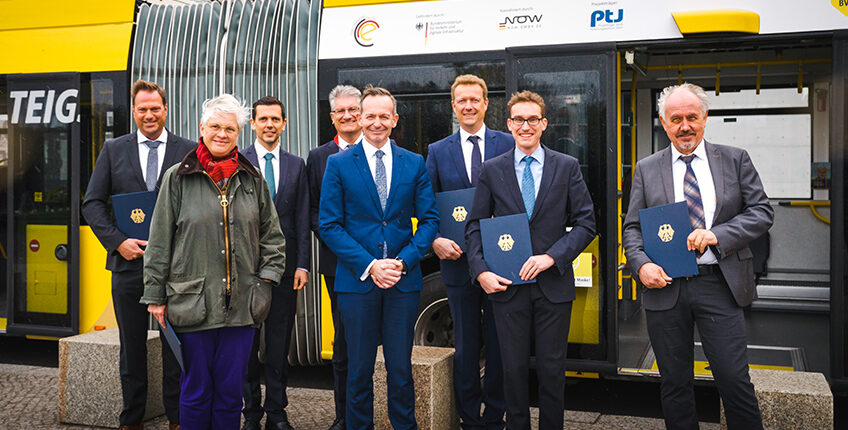Federal Transport Minister Dr. Volker Wissing hands over funding decisions totalling approximately 600 million euros for the procurement of climate-friendly buses.
Around 1,700 buses will be procured by transport companies under the new “Guideline on the funding of buses with alternative drives in passenger transport” (“Richtlinie zur Förderung alternativer Antriebe von Bussen im Personenverkehr”), of which approximately 1,400 are battery buses, 150 are fuel cell buses, 50 are overhead line buses and 100 are gas buses. The associated maintenance and charging infrastructure is also receiving funding support.
Volker Wissing: “Particularly in cities where many buses are on the roads, alternative drives can contribute enormously to reducing carbon and pollutant emissions as well as noise – and thus to improving the quality of life. That is why we are specifically supporting the conversion of diesel buses to alternative drives. In the future, 1,700 climate-friendly, quiet, state-of-the-art buses will be on the roads throughout Germany – and will be the driving proof that modern mobility is a benefit for citizens, the climate and the economy alike. Our goal is for 50 percent of city buses to be on the road with alternative, climate-friendly drives by 2030. I am pleased that the transport companies are tackling this important challenge together with us.”
The following eight transport companies received funding notifications today (incl. planned vehicle figures):
- KVG Kieler Verkehrsgesellschaft mbH: 50 battery buses
- Stadtwerke München GmbH: 71 battery buses
- Transdev GmbH Berlin: 325 battery buses, 40 fuel cell buses, 110 biomethane buses
- Bremer Straßenbahn Aktiengesellschaft: 50 battery buses
- Stadt Esslingen am Neckar: 51 battery-overhead line buses
- AeroGround Flughafen München GmbH: 72 battery buses
- Berliner Verkehrsbetriebe (BVG): 350 battery buses
- Regionalverkehr Köln GmbH: 108 fuel cell buses
Only one week earlier, notifications were also handed over to the transport companies Hamburger Hochbahn AG and Verkehrsbetriebe Hamburg-Holstein GmbH (VHH) in Hamburg.
The current handover of notifications marks the beginning of processing the first call for proposals from last year. Further applications are currently being evaluated. The second call for funding is currently being planned and is expected to be published in the second quarter of 2022.
More information on the “Guideline on the funding of buses with alternative drives in passenger transport”
Since 2021, the Federal Ministry for Digital and Transport (BMDV – Bundesministerium für Digital and Transport) has been funding the conversion of bus fleets to climate-friendly drives as part of the “Guideline on the funding of buses with alternative drives in passenger transport”. Funds of around 1.25 billion euros are available for this purpose until 2024, with supplementary funds planned for 2025.
The funding programme is designed to be open to all technologies in order to provide the right technology option for every application context. The focus is on the switch to battery-electric and fuel cell-based buses. The federal government covers up to 80 percent of the additional costs incurred compared to conventional vehicles. The development of the necessary infrastructure is also part of the funding. In addition, feasibility studies to determine how the conversion to alternative drives can be achieved at the respective location are also eligible for funding.
Further information on the guideline for funding buses with alternative drives in passenger transport can be found here.


